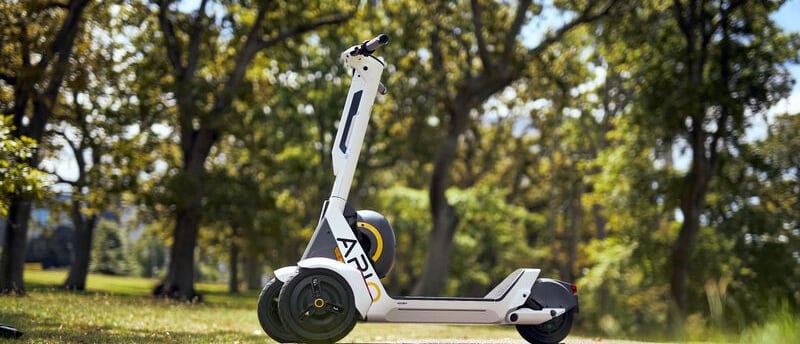Ario Scooters: Electrifying New Zealand's Micro-mobility Scene
Ario Scooters are poised to make a significant entrance into New Zealand's micro-mobility scene, offering innovative e-scooters with features like remote piloting technology. Their focus on sustainability and user convenience sets them apart, positioning them as a potential leader in the sector and contributing to a more sustainable urban future in New Zealand.
3/9/20243 min read


Ario Scooters: Electrifying New Zealand's Micro-mobility Scene
The emergence of Ario scooters onto the micro-mobility scene in New Zealand represents a pivotal shift towards sustainable urban transportation. As cities around the world grapple with congestion, pollution, and the urgent need for greener alternatives, Ario's entry into Aotearoa New Zealand is timely. In this article, we will explore the potential of Ario scooters to transform urban mobility, the innovative features that set them apart, and how they might shape the future of transportation in New Zealand.
A Brief Overview of Micro-mobility in New Zealand
The New Zealand micro-mobility market, including e-scooters, has shown impressive growth. In 2020, the market generated $9.5 million in revenue, with projections indicating a significant rise. E-scooters have been a game-changer in urban centers like Auckland and Wellington since their introduction in 2018. This adoption underscores a shifting attitude toward more sustainable, efficient forms of transportation.
Introducing Ario Scooters
Founded in 2023 and based in Auckland, Ario is a tech mobility company committed to redefining shared transport. With a focus on creating more accessible and connected urban environments, Ario introduces an innovative e-scooter equipped with smart features aiming to enhance rider safety, operational efficiency, and environmental sustainability. Ario’s philosophy centers on unlocking urban potential through tech-driven solutions, merged with a deep commitment to environmental friendliness.
The Anticipated Impact on the New Zealand Market
Ario scooters are poised to make a significant impact on New Zealand's micro-mobility scene. With features like a patented dual wishbone suspension system, three-wheel design for improved balance, and remote piloting technology for efficient redeployment, Ario addresses many of the operational and safety challenges faced by existing e-scooter schemes. Additionally, its focus on sustainability—aiming to reduce carbon emissions and promote eco-friendly transport—aligns with New Zealand's environmental goals.
Future Prospects and Industry Growth
The future of Ario in New Zealand looks promising. The company's innovative approach to design and sustainability, along with a burgeoning demand for eco-friendly transport options, sets the stage for a transformative impact. As urban mobility evolves, Ario's advancements in e-scooter technology and commitment to a greener future position it as a potential leader in the sector.
One of the standout innovations that Ario brings to the e-scooter market in New Zealand is its remote piloting technology. This feature represents a leap forward in terms of operational efficiency and user convenience, setting Ario apart from other e-scooter services.
At its core, the remote piloting technology enables Ario e-scooters to practically move autonomously. This means that instead of users or company personnel having to manually redeploy scooters for charging or to bring them closer to potential riders, Ario scooters can do this on their own. Let’s break down how this works and why it’s significant.
How Remote Piloting Works
Thanks to advanced technology integrated into each scooter, Ario’s e-scooters can be instructed via remote commands to navigate to specific locations. This could include returning to a central charging station at the end of the day or moving towards areas with higher demand during peak times. The technology uses real-time data and smart algorithms to determine the most efficient paths and timings for repositioning, ensuring scooters are always where they are most needed.
Benefits for Users and the Community
The benefits of this feature are manifold. Firstly, it significantly reduces the need for manual labor in scooter redeployment, thus lowering operational costs. Secondly, it ensures that scooters are readily available in high-demand areas, improving service reliability and user satisfaction. Lastly, by automatically returning to charging stations, it guarantees the scooters are always charged and ready to go, further enhancing convenience for users.
Simplifying Urban Mobility
Remote piloting technology simplifies urban mobility by ensuring that e-scooters are a more attractive and accessible option for short urban trips. This technology, in essence, enables e-scooters to serve users better by anticipating and adapting to their needs, thereby promoting a shift towards more sustainable and efficient urban transport solutions.
Conclusion
Ario's entrance into New Zealand's micro-mobility market is more than just the launch of a new e-scooter brand. It signals a step towards a more sustainable, connected, and efficient urban future. Through innovation, safety, and a focus on environmental sustainability, Ario aims to redefine urban transportation, making city life not only more manageable but also more enjoyable for all.
